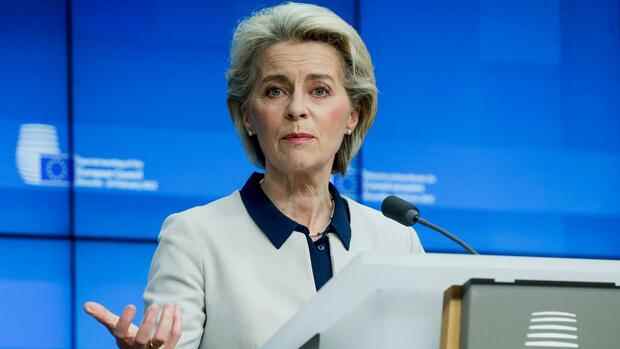Berlin The war in Ukraine sets a lot in motion. Old certainties, beliefs and beliefs in security policy were given up within days. The war could not only shake up security policy, but also European financial policy.
The EU Commission is not ruling out further suspending the debt rules suspended due to the corona pandemic in view of the Russian invasion of Ukraine in 2023. At the same time, the war is likely to have a significant impact on the reform debate on EU debt rules. “Nothing is the same now as it was before the war broke out,” says a senior EU diplomat.
In the first step, the EU Commission is preparing the EU states to postpone the reintroduction of EU debt rules, which were actually planned for next year, because of the war. In view of the current uncertainty, this step must be “reassessed,” said EU Economic Commissioner Paolo Gentiloni.
Top jobs of the day
Find the best jobs now and
be notified by email.
The Stability and Growth Pact has been suspended since the beginning of the pandemic in 2020 to give governments more fiscal leeway to fight the economic consequences of the Corona crisis. Among other things, it provides for an upper limit on new borrowing of three percent per year.
In its fiscal policy guidelines presented on Wednesday, the EU Commission now recommends that the budget and debt plans for 2023 should reflect the “individual circumstances of the EU countries”. The EU Commission intends to present more precise specifications in the spring.
However, many observers in Brussels expect that the EU will also completely suspend the debt rules in 2023. EU states would therefore not have to reckon with deficit procedures next year if they breached the debt rules.
The Russian invasion will “probably have a negative effect on EU growth,” Gentiloni said in an interview with Handelsblatt and other European media. There are effects on financial markets, pressure on energy prices and more persistent supply chain bottlenecks.
As a result, inflation in the euro area will remain higher than expected for the time being. Most recently, the rate of inflation in the euro area rose to 5.8 percent – an all-time high. The EU Commission had actually expected a decline. But an explosion in energy prices after the outbreak of war shattered that calculation.
On Wednesday, the price for a megawatt hour of natural gas for delivery in April on the Dutch reference market TTF shot up from 128 to almost 194 dollars within two hours – a record high. The oil price had already skyrocketed.
All of these problems are weighing on business sentiment, “which could curb investment and consumption,” Gentiloni said. However, the Monetary Commissioner does not consider a “stagflation” scenario with high inflation but low growth rates to be very likely. “The good news is that the upswing in Europe is basically intact.” Gentiloni is therefore sticking to the original EU demand that highly indebted EU countries should reduce their debt levels.
Despite the not so bleak economic prospects, however, a discussion has begun as to whether and how the EU debt rules can be adapted to the new security situation. The focus now: defense spending.
The debt ceiling of 60 percent is de facto obsolete
Due to the high level of debt as a result of the Corona crisis, the EU Commission wants to revise the debt rules. The average debt of the euro countries, measured against their annual economic output, is almost 100 percent, some countries such as Italy are far higher.
The actual debt ceiling of 60 percent is therefore de facto obsolete, or reaching the target would involve such brutal austerity measures in the respective states that even many liberal economists refuse to simply put the old rules back into force.
The EU is therefore currently discussing various reform proposals. One envisages exempting investments, particularly in green technologies, from the EU debt rules. Investing in digital is the second area that could potentially be addressed separately in the new EU debt framework.
A third, completely new area is now being added with defense spending. Ironically, Germany, which otherwise always insists on strict debt rules, is pushing ahead by wanting to create a special fund for defense spending in the constitution. A blueprint possibly for other EU countries?
“Chancellor Olaf Scholz’s decision to increase defense spending in this way is historic and a major turning point for all of Europe,” Gentiloni said. The EU has not yet found a common line in the discussion about reforming the EU debt rules. The Commission stands by its view that green investments must be given priority. “But I’m open to thinking about investing in Europe’s autonomy when it comes to debt rules. This can also include certain defense spending,” Gentiloni said.
Defense spending could no longer fall completely under the debt rules. Gentiloni reiterated: “This is the moment when Europe must develop a common defense and energy policy. We must no longer be dependent on Russian gas.” However, Gentiloni said he wanted to counter any impression of creating a “Christmas tree” to which every state could wish for exceptions.
More: How some southern EU states are slipping deeper and deeper into debt – and how others can free themselves
